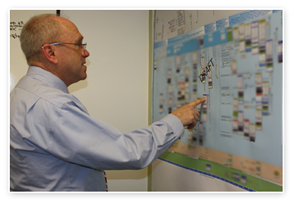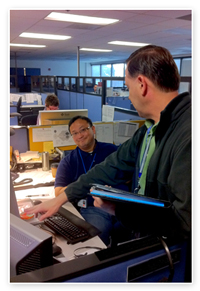 Not all incidents are considered a MI. Even some high priority incidents may not follow the MI escalation path as they may affect a single customer or are clearly isolated. However, incidents that can jeopardize our clinical or business operations are handled as a MI and follow a distinct course of actions. During this first level of escalation, technical resources are quickly convened, customers are notified and engaged, and steps are agreed upon and communicated clearly. The Major Incident Response Team (MIRT) begins to forms to work together to solve the problem. Often, a troubleshooting bridge is established so that teams can easily communicate what they are seeing and hearing throughout the environment.
Not all incidents are considered a MI. Even some high priority incidents may not follow the MI escalation path as they may affect a single customer or are clearly isolated. However, incidents that can jeopardize our clinical or business operations are handled as a MI and follow a distinct course of actions. During this first level of escalation, technical resources are quickly convened, customers are notified and engaged, and steps are agreed upon and communicated clearly. The Major Incident Response Team (MIRT) begins to forms to work together to solve the problem. Often, a troubleshooting bridge is established so that teams can easily communicate what they are seeing and hearing throughout the environment.
The Incident Commander or IC is a key member of the team and he or she takes on the role of managing the team and their actions all the way to closure.
 Multiple calls have come into the Service Desk from Nursing and the Emergency Department with reports that they are receiving “access denied ” messages when trying to log onto the system. A High priority ticket has been assigned to the Applications Team. The Analyst responsible for support confirms that there is an issue. She begins her diagnostics to determine how widespread the problem is. This could be significant.
Multiple calls have come into the Service Desk from Nursing and the Emergency Department with reports that they are receiving “access denied ” messages when trying to log onto the system. A High priority ticket has been assigned to the Applications Team. The Analyst responsible for support confirms that there is an issue. She begins her diagnostics to determine how widespread the problem is. This could be significant.
What should happen next?

 The correct answer is E - ALL OF THE ABOVE.
The correct answer is E - ALL OF THE ABOVE.
 A. CORRECT Any issue that has the potential to have significant impact to the organization should be escalated as a Major Incident.
A. CORRECT Any issue that has the potential to have significant impact to the organization should be escalated as a Major Incident.
 B. CORRECT The IC is taking the lead on this MI and will manage it to resolution.
B. CORRECT The IC is taking the lead on this MI and will manage it to resolution.
 C. CORRECT Any member of the MIRT may open a technical “troubleshooting” conference bridge. This dedicated bridge helps with communication within and across teams.
C. CORRECT Any member of the MIRT may open a technical “troubleshooting” conference bridge. This dedicated bridge helps with communication within and across teams.
 D. CORRECT Informing our customers of MIs that can impact their workflow or the delivery of care is critical. In some situations, our customers will need to prepare for work-around solutions and communicate in a timely manner to their teams about what to expect.
D. CORRECT Informing our customers of MIs that can impact their workflow or the delivery of care is critical. In some situations, our customers will need to prepare for work-around solutions and communicate in a timely manner to their teams about what to expect.
 E. CORRECT All of the above are important steps in addressing MIs quickly and effectively.
E. CORRECT All of the above are important steps in addressing MIs quickly and effectively.
Please provide a correct answer to advance to the next slide.